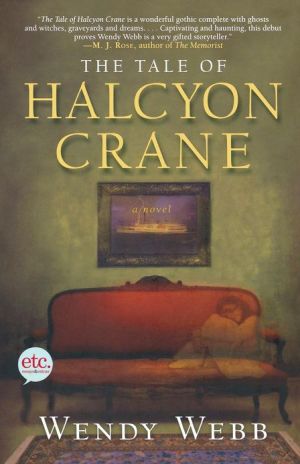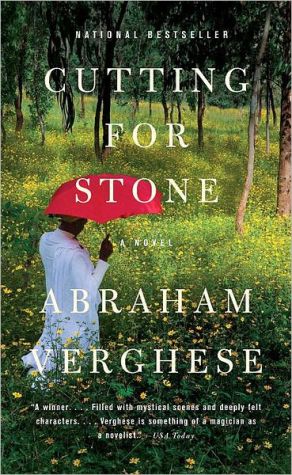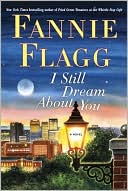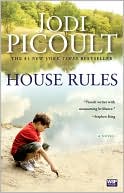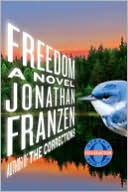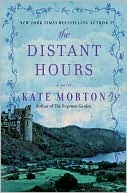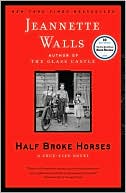The Tale of Halcyon Crane
A young woman travels alone to a remote island to uncover a past she never knew was hers in this thrilling modern ghost story\ When a mysterious letter lands in Hallie James’s mailbox, her life is upended. Hallie was raised by her loving father, having been told her mother died in a fire decades earlier. But it turns out that her mother, Madlyn, was alive until very recently. Why would Hallie’s father have taken her away from Madlyn? What really happened to her family thirty years ago?\ In...
Search in google:
A young woman travels alone to a remote island to uncover a past she never knew was hers in this thrilling modern ghost storyWhen a mysterious letter lands in Hallie James’s mailbox, her life is upended. Hallie was raised by her loving father, having been told her mother died in a fire decades earlier. But it turns out that her mother, Madlyn, was alive until very recently. Why would Hallie’s father have taken her away from Madlyn? What really happened to her family thirty years ago? In search of answers, Hallie travels to the place where her mother lived, a remote island in the middle of the Great Lakes. The stiff islanders fix her first with icy stares and then unabashed amazement as they recognize why she looks so familiar, and Hallie quickly realizes her family’s dark secrets are enmeshed in the history of this strange place. But not everyone greets her with such a chilly reception—a coffee-shop owner and the family’s lawyer both warm to Hallie, and the possibility of romance blooms. And then there’s the grand Victorian house bequeathed to her—maybe it’s the eerie atmosphere or maybe it’s the prim, elderly maid who used to work for her mother, but Hallie just can’t shake the feeling that strange things are starting to happen . . .In The Tale of Halcyon Crane, Wendy Webb has created a haunting story full of delicious thrills, vibrant characters, and family secrets.Library JournalHallie James, a divorced thirtysomething working as a copy editor for the local newspaper and dealing with her father's descent into Alzheimer's, receives a letter from a woman named Madlyn Crane who claims to be her mother. Hallie had been told her mother died in a fire when she was six, so she travels to a remote island in the Great Lakes to learn more. She meets with her mother's lawyer, who happens to be one of her childhood friends, and is told that her father had faked both his and Hallie's deaths to escape justice and then raised her under an assumed name. Unable to accept this account, Hallie sets out to clear her father's name. Even as she struggles with the islanders, who might not want past events revisited, Hallie is tormented by ghosts as she learns her family history and tries to piece together the truth. VERDICT Despite a few clichés, Webb offers an engaging modern gothic tale with a strong female protagonist and well-done suspense. Fans of Mary Higgins Clark and Barbara Michaels and readers who like supernatural elements in their fiction will enjoy this debut.—Beth Blakesley, Washington State Univ. Lib., Pullman
1\ I was the only passenger on the ferry crossing to Grand Manitou Island. As I stood on deck holding tight to the railing while we dipped and tumbled on the green, roiling waves, I understood why tourist season grinds to a halt when the November winds blow.\ I was called to the tiny island in the middle of the Great Lakes by a dead woman. I traveled there at an unwelcoming time of year to learn the story of her life, hoping to discover my own story as well. A few whitecaps and swells wouldn’t keep me away.\ A summons from the dead is a strange way to begin a tale, but, as I have since learned, it’s really no stranger than any other story in my family. As it turns out, I come from a long line of people who hover on the edge of reality. My family history isn’t merely a chronicle of births and deaths and weddings and accomplishments, though it includes those things. No, the stories of my relatives sound more like fairy tales—Grimm’s, unfortunately—with witches, hauntings, and malevolence all wrapped up in regrettable and sometimes bloody mishaps.\ Until recently, I knew nothing of this. Growing up, I had an altogether different notion of who I was and where I came from. Then the truth began to reveal itself, as it always does. Truth seeks the light of day, needs it just like we need air, and so it finds ways to seep out of the sturdiest, most skillfully hidden boxes—even those buried deeply in the hearts of the dead.\ My truth took its first breath one foggy autumn morning, nearly a thousand miles away from where I stood on the tossing ferry. That particular day didn’t begin with anything out of the ordinary. Isn’t that always the way? Life is thrown into chaos while you’re making your way through mundane everyday tasks—an accident on the way to the grocery store takes your beloved, a heart attack interrupts a lazy Sunday morning, or, in my case, life- altering news arrives with the morning mail.\ I awoke in my little bungalow overlooking Puget Sound and lay in bed awhile, listening to the barking of the seals. Then I pulled on a sweatsuit and sneakers and headed outside for my usual morning walk. I had already crossed the street and started up the hill before I noticed the fog settling in, dulling the edges of the world around me.\ Some people find the sound of a foghorn romantic, evoking images of travel to faraway places with strange- sounding names. But I’ve never liked the fog. It obscures reality with what seems to be sinister intent, erasing all that is not within arm’s reach. Anything could be out there, beyond.\ I knew it was silly, being unnerved by fog in a seaside town, so I continued to walk my usual route, listening to the tinkling of the wind chimes—tubular bells— that were hanging from the eaves of various houses along the way.\ I can’t explain why—did I sense what was coming?—but the back of my neck began to tingle with a thousand tiny pinpricks. I paused, holding my breath, dread seeping off the cold pavement into the bottoms of my feet and working its way up my legs. Then something convinced me to hurry home, and I arrived at my door just in time to see the mailman materialize out of the fog.\ "Pea soup," he said, shaking his head as he handed me a stack of mail.\ "You be careful out there, Scooter." I smiled at him. "I couldn’t see you until you were on my front step."\ "Don’t you worry about me, Ms. James. I’m old friends with this fog."\ I watched him disappear into the whiteness and took the mail inside, where hot coffee was waiting, and poured myself a cup as I sorted through the stack. Along with the usual assortment of letters, bills, and catalogs was a large manila envelope labeled archer & son, attorneys-at-law. I noticed the postmark: Grand Manitou Island, a popular tourist destination in one of the Great Lakes, halfway across the country from my home.\ I sat at my kitchen table sipping coffee, turning the envelope over and over in my hands. What was this about? What did this lawyer want with me? Finally, I took a deep breath and tore it open to face whatever it contained.\ I found two letters inside. One bore my name and address handwritten on the front of a thick creamy envelope, the back flap sealed with crimson wax. It was old-fashioned and lovely, reminding me of an invitation from another time and place. (As it turned out, that’s exactly what it was.) The other was a white business-sized no- nonsense envelope. I opened that one first.\ Dear Ms. James,\ It is with deep regret that I inform you of Madlyn Crane’s death. I am Ms. Crane’s attorney and the executor of her will. Please contact me at your earliest convenience.\ Respectfully yours, William Archer Attorney- at- law\ Madlyn Crane. The name sounded familiar, but I couldn’t quite place it. Why did this lawyer regret to inform me of her death? A feeling of undefined, unexplainable apprehension began to cling to me as I picked up the second letter. Why was my heart pounding so? Why were my hands shaking? I broke the seal on the back of the envelope, unfolded the letter, and began reading. It was dated almost one month ago.\ Dear Hallie,\ Thirty years ago, my daughter and my husband were killed in a boating accident near our island home. Imagine my surprise to find that they—you and your father—are very much alive.\ I don’t quite know how to continue this letter. What do I say to my only child, for whom I have grieved all these years?\ I’ll start here. When I learned that you were alive, I was as stunned as you must be now. I had the impulse to pick up the phone and call you immediately, but then it hit me: I could not do that. I had no idea what you had been told.\ Did you believe I was dead? Did you believe I had abandoned you? Your father could have told you anything. But now you’re a grown woman. If you had any inkling I was alive, you would have found a way to contact me. I came to the conclusion that you and I must have been told the same lie, each believing the other was dead. We were both deceived.\ How does a mother rise from the dead and enter her child’s life? I thought of coming to see you, but simply showing up on your doorstep did not seem wise. A letter seemed like the gentlest way to turn your world upside down.\ I know you must have many questions, as do I. I’ll tell you a little about myself now, but really, can one sum up a lifetime in a few words? My name is Madlyn Crane. I still live in the house where you were born on Grand Manitou Island. You may recognize my name. I am a photographer. You may have seen my work in various magazines.\ I imagine you grew up grieving for me, wishing to have a mother to shepherd you through the heaven that is childhood and the purgatory that is adolescence. I’m so sorry that I was not there for you. But Hallie, every time you wished for a mother’s love, you had it. I loved you before you were born, I loved you during the empty years when I thought you were dead, and I love you now. That will never change. Although you did not know it, you have always had a mother who loved you more than anything.\ I know you must be wondering what to think about this—a letter from a stranger who is alleging to be your mother. Is it true? I’m sure it flies in the face of everything you have believed about your life for the past thirty years.\ I’m sorry to create such a tempest for you; believe me, I considered staying "dead" to spare you this confusion, but I concluded that the truth, no matter how painful, must be told.\ By way of authentication, please look at the photograph I am enclosing. It is you and your father, a few days before you "died." I took it myself. I also offer this— an invitation. Come back to Grand Manitou Island. So much time has been wasted already.\ Love from your mother, Madlyn Crane\ The photograph fluttered out as I let the letter drop to the ground. It was a small, square, black-and-white print with a white border. I saw a little girl with a strange sheen in her eyes. Was it me? It certainly looked like me, but I couldn’t really be sure. It might have been any dark-haired girl. But there was no mistaking my father—younger, thinner, with more hair, but unquestionably him. This was the man who put me to bed and dried my tears and took me ice-skating. I had no doubt.\ I picked up Madlyn Crane’s letter and read the words over and over again, until they blurred into meaningless symbols. I don’t know how long I sat there, staring at it: a letter from a ghost.\ 2\ The drive from my house usually took twelve minutes. On this day I did it in six, a lifetime of questions and more than a few accusations flying through my mind.\ My mother’s name was Annie James, and she died in a fire when I was five, or so my father had told me. He said he carried me out of our burning house and tried to go back to save her, but the flames were too intense. The house was engulfed before the firefighters arrived. That’s why there were no pictures of her, no records, no mementos of our life together as a family. He was hailed as a hero at the time, but he certainly didn’t feel like one. Annie James had no other family, he told me. No grandparents, aunts, uncles, or cousins from her side. I had no surviving grandparents on his side, either, so we were alone in the world, just he and I.\ Even as a child, I realized that the story of my mother’s death was a tidy little tale, with no loose ends for a girl’s questions to unravel. When I asked my dad about her—What was she like? Did she have hair like mine?—I could see his grief, as tangible and blinding as a snowstorm. Please don’t ask, Hallie. Put it out of your mind. She’s gone.\ As I sped through yellow lights, my questions morphed into a mix of anger and defensiveness. Over the years I had created a tangible mother in my mind—brown hair, brown eyes, medium build. She had a sort of Jackie Kennedy quality. She liked those colorful pantsuits that were so popular in the 1970s, but we wore mother-daughter dresses to important events. She was kind but firm, loving but playful. Graceful. Elegant. If this letter was true—which it couldn’t be—it would negate the only mother I had ever known. I wasn’t about to let a stranger kill off my mother in a few short paragraphs.\ Not to mention the fact that, if this letter was true, Madlyn Crane was accusing my father of something horrible. I loved my dad with the fierce feelings of protection common to children of single parents. How dare this woman, this stranger, flutter into my life and call my father—my dad— a liar? She accused him of faking our deaths and whisking me off across the country. She was basically saying I was an abducted child, someone whose photo might have appeared on a milk carton.\ Where did she get off? Men like my dad don’t abduct children from their mothers and assume new identities. Men like my mathematician father find rational solutions to problems. It was absurd and insulting, the whole thing. I couldn’t imagine what would motivate this woman to make up such a cruel pack of lies.\ But wasn’t it a little odd that there were no photographs of my mother? No relatives? No friends who could talk about our life together? What if it wasn’t grief but fear that I had seen in my dad’s eyes when I mentioned my mother? What if he had lived for thirty years afraid that every day would be the day his abandoned wife, my abandoned mother, would show up on our doorstep? That would certainly explain his reluctance to talk about her.\ Funny thing is, I remember the fire. I can see the flames and the smoke, hear the screaming and the roar of the fire trucks, feel the spray from the hoses. Was this nothing but a shadow of what never was, a memory deliberately implanted by years of storytelling? That’s how powerful stories are. They can actually create the past if told often enough.\ Janine, the day nurse, looked up as I walked in. Her smile faded when she saw my expression. "What’s the matter?" she asked, but I put a hand up, as if to stop her words in midair. I walked by the nurses’ station toward the recreation room, where I knew my father would be sitting.\ I found him in front of the window, where he spent most of his days. He loved to watch the birds at the feeder. Their movements entranced him, or perhaps he was simply fascinated by those strange, flitting bits of color hovering in the air outside. It was impossible to know. I pulled up a chair and took his hands in mine.\ "Dad?" I said gently. "Dad, it’s Hallie."\ He turned his head carefully. His deliberate slow-motion movements reminded me of a fetus in the womb, floating in another dimension, one with a thicker, viscous atmosphere, suspended there awaiting the time when he would enter a new world. He looked at me, a mix of innocence and confusion in his eyes.\ "Did you bring my lunch?"\ My conflicted emotions melted into the sorrow and grief that always overcame me when I visited my father these days. The great man, the profound thinker, reduced to this. I smiled sadly at him. "Janine will bring your lunch in a little while, Dad."\ What was I doing here? I wanted answers, but he was clearly unable to provide them. I sighed and squeezed his hands, the love and loss filling my throat.\ "Hallie?" My father’s voice brought me back into the moment. A smile crept onto his face.\ It was to be one of those days, then. I had been hoping for it. Most of the time, my father didn’t recognize me, his eyes expressionless, his spark extinguished. It was as though his spirit was submerged deep inside his body, exploring some hidden world within. I often wondered where his spirit had gone and what it was doing while the husk that looked like my father sat motionless in his chair, staring at birds.\ Every so often, though, he would have moments of lucidity. His eyes would become clear and bright as he rose to the surface, animating the lifeless features with his familiar spark. He would know me again. He would smile and say, "Come to see your old dad, eh?" And we’d be able have a conversation, albeit a brief one. Soon enough, I’d lose him as he descended back into the depths of his being. The doctors told me that was typical of Alzheimer’s patients.\ "I’ve come to ask about Mom."\ "Your mother?" He frowned at me, confused.\ I knew I didn’t have much time, so I dove right in. "Did you take me away from her on purpose, Dad?" I couldn’t believe I had even said the words. They sounded so idiotic, so untrue.\ He leaned in and put a finger to his lips. "I saw your mother yesterday," he admitted, his eyes darting back and forth, making sure nobody was listening. "I looked out of my bedroom window and there she was, walking in the courtyard."\ I was silent for a moment. "You saw Mom?"\ He slowly nodded his head. "She was wearing that long purple dress she used to like so much." A smile, then. "I think she’s come for me this time, Hallie."\ His earnestness gave me a chill. "Dad." I held his hand. "I got a letter today from somebody claiming to be Mom."\ "Madlyn wrote to you?"\ I took a sharp breath. He said Madlyn, not Annie. "Did you do it?" I managed to ask. "Why, Dad? Why did you take me away from her?"\ He smiled, his eyes brimming with tears as he stroked my cheek. "I had to save my little girl."\ "Save me from what?"\ The tears spilled onto his face. "From that place, Hallie. It would have destroyed you."\ And that was it. My window of time was gone, at least for that day. He turned back to the birds. I held my hand to his cheek, as if I were trying to transfuse all the love I felt for him into his veins.\ "And I thought he was having such a good morning." It was his nurse, there with his lunch tray.\ "He was, Janine. It’s just. . . ." My words trailed off into a long sigh. I looked up at her in silence.\ "I know, honey, I know. It never gets any easier. For us or for them."\ I hugged my father tight as I got up to leave. "I love you, Dad," I said, hoping, wherever he was within that shell of a body, he heard me.\ The next morning I got the call.\ "Did he say anything?" I choked, the emotion shredding my voice to a rasp. "Did he ask for me?"\ "I’ve seen a lot of death in my years here, honey," Janine told me softly. "They almost never have any last words. Dying is too hard."\ Excerpted from The Tale Of Halcyon Crane by Wendy Webb.\ Copyright © 2010 by Wendy Webb.\ Published in 2010 by Henry Holt and Company, LLC.\ All rights reserved. This work is protected under copyright laws and reproduction is strictly prohibited. Permission to reproduce the material in any manner or medium must be secured from the Publisher.
\ Library JournalHallie James, a divorced thirtysomething working as a copy editor for the local newspaper and dealing with her father's descent into Alzheimer's, receives a letter from a woman named Madlyn Crane who claims to be her mother. Hallie had been told her mother died in a fire when she was six, so she travels to a remote island in the Great Lakes to learn more. She meets with her mother's lawyer, who happens to be one of her childhood friends, and is told that her father had faked both his and Hallie's deaths to escape justice and then raised her under an assumed name. Unable to accept this account, Hallie sets out to clear her father's name. Even as she struggles with the islanders, who might not want past events revisited, Hallie is tormented by ghosts as she learns her family history and tries to piece together the truth. VERDICT Despite a few clichés, Webb offers an engaging modern gothic tale with a strong female protagonist and well-done suspense. Fans of Mary Higgins Clark and Barbara Michaels and readers who like supernatural elements in their fiction will enjoy this debut.—Beth Blakesley, Washington State Univ. Lib., Pullman\ \
